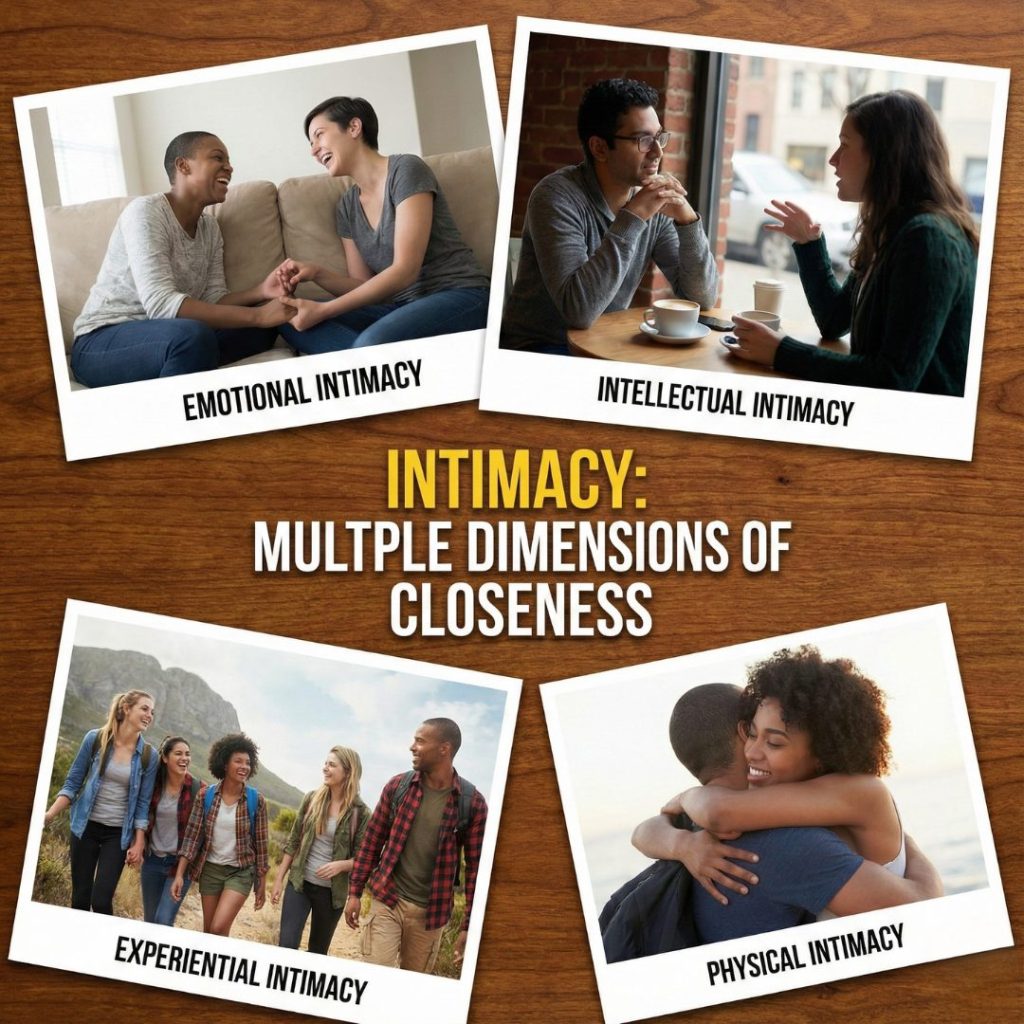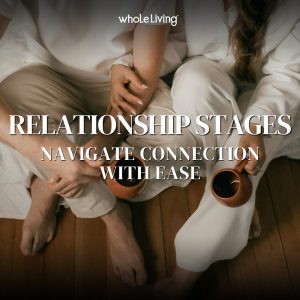What does intimacy mean when your world feels loud and always demanding your attention? You live in a time when constant noise pulls you away from yourself and from the people who matter. You move through days filled with tasks, alerts, and responsibilities. Yet within all this noise, you still long for closeness that helps you feel alive. This feeling of intimacy brings emotional closeness and a sense of being truly seen. You crave moments that help you feel connected. You want a relationship with depth, honesty, and warmth. Intimacy becomes your quiet reminder that connection still matters in a fast moving life. To nurture this, it helps to focus on meaningful relationships and direct your attention toward what truly matters.
Intimacy grows when you slow down. It grows when you allow yourself to be seen with your true feelings. You learn that intimacy is not only about physical closeness. It is also about emotional intimacy, spiritual intimacy, warm friendship, and the gentle bonds that help you trust another person. These familiar connections foster comfort and a sense of belonging. When you explore intimacy with care, you begin to see how connection shapes your life in meaningful ways.
Understanding the Many Layers of Intimacy

Intimacy involves more than one kind of closeness. It exists in your words, your actions, your shared dreams, and the way you spend time with someone you care about. When you ask yourself what does intimacy mean, you begin to understand how each layer brings its own strength. Intimacy becomes a quiet bond that forms through truth, presence, and softness. For example, small gestures like holding hands, sharing personal stories, or spending quiet time together are examples of how different forms of intimacy can be expressed.
Emotional intimacy grows when you share your thoughts without fear. It develops when you talk with honesty and listen without judgment. Emotional closeness reminds you that you are human, and your feelings deserve a safe place to land. This kind of intimacy supports your relationship with your partner, your friends, your spouse, or your family.
Spiritual intimacy supports connection on a deeper level. It may involve sharing values, beliefs, or moments of stillness. You may sit together in nature, meditate, pray, or simply breathe in silence. What you share spiritually helps you understand each other with softness.
The Quiet Strength of Emotional Connection

Emotional intimacy helps you feel understood. It allows you to reveal your feelings with trust. When you open your heart, you build a bond that strengthens your relationship. The depth of this connection is often felt in the way you and your partner experience mutual understanding and genuine caring. Many people struggle with emotional intimacy because fear or past pain creates distance. Yet emotional closeness helps you heal.
Conversation plays a major role in building this layer of intimacy. Ideas, worries, dreams, and hopes begin to flow more openly in this kind of connection. Conflicts are talked through with patience instead of anger, and this honesty gives your partner a clear view of who you are inside. These moments create a safe room where your feelings can exist without shame.
Healthy emotional intimacy encourages balance. Respect, kindness, and openness become the ground you stand on together. Desires and needs are expressed with honesty that feels safe. Your partner’s words are heard with real care, allowing deeper understanding to grow. Closeness strengthens through steady effort, not pressure, and you begin to feel how meaningful that slow growth truly is.
Physical Intimacy: Touch That Speaks Without Words

Physical intimacy includes gentle touch, holding hands, warm hugs, and moments of closeness that help you feel safe. The bed can be a special space for meaningful connection and comfort, where partners share emotional closeness and foster intimacy. It may also include sex, but sex alone does not define intimacy. Physical closeness supports connection when it is shared with trust, communication, and mutual respect.
Your partner learns your comfort levels. You learn theirs. Physical intimacy becomes more meaningful when you discuss your desires with kindness. Honest communication reduces confusion and builds satisfaction.
Physical closeness reminds you that your body carries wisdom. When shared with care, it strengthens your bond. It helps you feel supported in ways that words sometimes cannot express.
READ ALSO: Emotional Intimacy Feels Better When You’re Grounded
Intimacy Beyond Romance

Intimacy is not only for romantic relationships. It also exists in warm friendship, family bonds, or connections built on understanding. Sharing your feelings with a close friend helps your heart breathe a little easier. Their struggles become something you listen to with real presence. Trust forms naturally, growing in the quiet space you both hold for each other. These moments reflect intimacy without romance. Such intimacies can include emotional bonds, familial closeness, and even physical or supportive gestures, showing that close personal connections take many forms in friendships and family relationships.
Family relationships also carry their own form of intimacy. Sharing meals, talking openly, and offering comfort strengthen these bonds. You learn that intimacy shows up wherever honesty and care exist.
Even in your relationship with yourself, intimacy grows. You learn your own desires, dreams, fears, and strengths. You connect with your inner world and understand your emotional needs.
Intimacy and Communication: The Heart of Connection

Communication builds intimacy. When you talk honestly, you open a path to understanding. You talk about your feelings, your needs, your stress, and your dreams. You listen to your partner with patience. Ignoring your partner's needs or feelings can damage intimacy and prevent genuine connection.
Healthy conversation helps you move through conflict with clarity rather than fear. You learn how to express pain without harming the person you love. You learn how to stay steady when emotions rise.
Your partner feels safer when communication feels open. You build a foundation that holds your relationship through changing moods and daily challenges. Recognizing and responding to your partner's mood is essential for deepening emotional closeness and support.
READ ALSO: Love Languages: Nourish the Way You Give and Receive
Intimacy and Desire: Honoring What You Feel

Sexual desire is a natural part of many intimate relationships. Desire grows when you feel emotionally close and physically connected. You talk about your needs with honesty. Expressing appreciation for your partner can deepen both emotional and physical intimacy, helping to foster trust and a stronger connection. You listen to your partner’s needs without judgment.
Sex becomes meaningful when it is guided by respect. Speaking your desires openly invites honesty into the space between you. Trust grows when you let yourself be seen with calm clarity. You also learn that sex is not a solution to relationship problems, but a reflection of the care that already exists. Instead, it reflects the closeness you build through communication and emotional care.
Healthy intimacy involves both emotional and physical connection. Balancing your feelings with moments of physical closeness helps you stay grounded in the connection you share. Personal boundaries become something you honor with calm intention, and you offer that same respect to your partner’s boundaries as well.
The Role of Vulnerability in Intimacy

Intimacy asks you to be vulnerable. Vulnerability makes many people uncomfortable, yet it brings deep connection. If you avoid vulnerability, you may miss out on authentic intimacy and the chance to truly connect with your partner. When you reveal your true feelings, you create space for trust.
Vulnerability involves sharing your fears, your dreams, and the parts of yourself that feel fragile. You allow another person to see you fully. This kind of intimacy strengthens your bond.
When you practice vulnerability, you realize that honesty builds closeness. You notice how your partner responds with care. You feel seen in ways that make you feel alive.
Intimacy Through Shared Time

Intimacy deepens when you spend time together. Quiet moments with your partner become easier when distractions fade into the background. Small shared rituals begin to nurture your closeness, whether you are talking, laughing, cooking, walking, or simply resting in the same space.
Shared time helps you feel connected. It keeps your relationship grounded. You give your full presence to the moment.
Even small routines create intimacy. A morning talk, a nightly hug, or a shared meal brings connection into everyday life. For example, sharing your reaction to a book you both read or discussing a movie together can be a meaningful way to build intimacy.
READ ALSO: Obsessive Relationship Disorder Can Feel Like Love
Spiritual Connection: Finding Meaning Together

Spiritual intimacy is a quiet force that brings partners closer in an intimate relationship. When you and your partner share your values, beliefs, and spiritual practices, you create a bond that goes beyond words. This kind of connection might involve sitting together in meditation, sharing moments of gratitude, or simply talking about what gives your life meaning.
Spiritual intimacy helps you feel understood on a deeper level. It supports emotional intimacy by allowing you to share your hopes and dreams without fear. It also strengthens physical intimacy, as a sense of shared purpose can make touch and closeness feel even more meaningful. In romantic relationships, spiritual connection often becomes the foundation for lasting relationship satisfaction and a sense of warm friendship.
When you create space for spiritual connection, you invite more understanding and closeness into your relationship. You learn to support each other’s growth, celebrate your differences, and find comfort in shared rituals. Spiritual intimacy reminds you that your relationship is not just about the day-to-day, but about building a life together with intention and care.
How Intimacy Helps You Grow

Intimacy supports growth. It gives you confidence. Understanding the answer to why people seek intimacy helps explain their motivations and emotional needs. It reminds you that you are not alone. You learn to trust others and also trust yourself.
Intimacy teaches you patience. It teaches you understanding. It shows you how to love in ways that feel full and honest. Strong intimacy helps you maintain healthy relationships. It supports clearer communication, deeper affection, and greater satisfaction.
Intimacy Within Marriage

Marriage requires steady intimacy. You and your spouse learn how to communicate through change. A husband plays a vital role in fostering emotional and physical intimacy by being attentive, showing affection, and engaging in shared activities with his partner. You grow as partners. You talk through conflict with understanding.
Marriage thrives on emotional closeness, physical intimacy, and shared dreams. You create a bond that holds your relationship steady. When you nurture intimacy, your marriage feels warmer, safer, and more connected.
Creating Space for Intimacy in a Busy World

Your world often moves too fast. You experience stress, pressure, and constant demands. Intimacy needs space to grow. This space begins to open naturally when you choose to slow your pace and meet the moment with softness.
Putting your phone aside helps you be fully present, allowing you and your partner to settle into a real moment together. Honest conversation flows more easily, and the relationship gains the space it needs to breathe and stay healthy.
When you create intentional moments, intimacy becomes easier to reach. You notice how much connection your heart can hold. Creating this space also allows you and your partner to talk about your future together, share aspirations, and make plans that deepen your bond.






